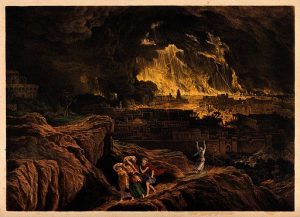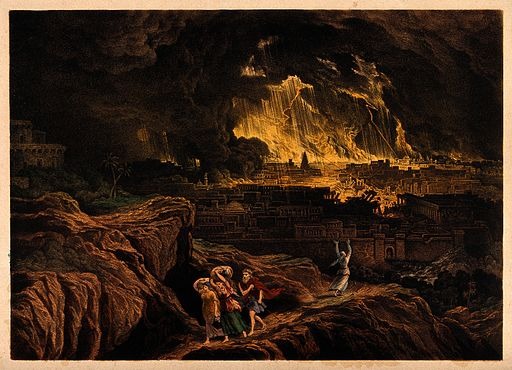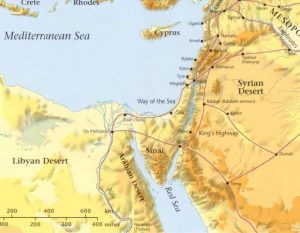by Lois Tverberg
Lot looked up and saw that the whole plain of the Jordan was well watered, like the garden of the LORD, like the land of Egypt, toward Zoar. (This was before the LORD destroyed Sodom and Gomorrah.) So Lot chose for himself the whole plain of the Jordan and set out toward the east. The two men parted company: Abram lived in the land of Canaan, while Lot lived among the cities of the plain and pitched his tents near Sodom. Now the men of Sodom were wicked and were sinning greatly against the LORD.
– Genesis 13:10-12
Even though the Lord makes Abram wait for years to have the thing he most longs for, a son, God starts to bless Abram materially immediately by multiplying his flocks and Lot’s too. At a certain point, Abram’s and Lot’s families have to part ways because their flocks are too large for the land that they have for them.
In this story, the difference between Abraham and Lot’s character becomes very obvious. Abraham graciously offers Lot first choice of the land, and Lot immediately takes advantage of the offer to choose the best and nicest for himself. In doing so, he abandons Canaan, the land God promised them in order to choose what was, in his opinion, better.
Interestingly, Jewish commentaries point out that the way Sodom is described is a subtle commentary on what it is really like. It looks like the “garden of God,” meaning the garden of Eden. They point out that even though Eden was paradise, it was the place of human disobedience from which humans finally were exiled. Sodom will be the same way – it is a place of great disobedience to God from which Lot will have to leave when God’s judgment comes. Next, Sodom is compared to the land of Egypt in beauty. But the Egyptians were known for their sexual immorality, and Abram feared that they would kill him to get his wife. That is another picture of Sodom, which is known for its sexual perversion. This is a hint, once again, to what Sodom is really like.
Then, Lot gets pulled in entirely into the life of Sodom – when he moves there, he doesn’t just camp away from people where his sheep can graze, he moves close to the city people who are known for their perversity. Lot was even involved in city affairs, “sitting in the gate” (the community center of the city), fully a participant in an evil culture.
 Lot was truly foolish. He abandoned the good things God had offered to choose something that at first glance seemed better. But while it was attractive on the surface, underneath its appearances, it was a place of sin and rebellion. Not only did he choose it, he sank deeper and deeper into sin once he had moved there. Because of Lot’s foolish choices, he lost all of his inheritance, all of his wealth, and he even lost his wife when he had to flee. Unlike Abraham who lived not by sight, but by clinging to God’s promises, Lot ran after what looked good on the surface, even though it would later cost him dearly.
Lot was truly foolish. He abandoned the good things God had offered to choose something that at first glance seemed better. But while it was attractive on the surface, underneath its appearances, it was a place of sin and rebellion. Not only did he choose it, he sank deeper and deeper into sin once he had moved there. Because of Lot’s foolish choices, he lost all of his inheritance, all of his wealth, and he even lost his wife when he had to flee. Unlike Abraham who lived not by sight, but by clinging to God’s promises, Lot ran after what looked good on the surface, even though it would later cost him dearly.
Aren’t our own choices too much like that sometimes?
photocred: Wellcome Images



